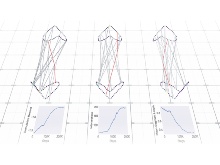Computational Co-Design for Fiber Composite Building Systems
Integrative Computational Design Methods for the Design Space Exploration of Complex Building Components
Coreless winding of lightweight fiber composite systems enables highly differentiated placement of high-performance, load-bearing materials and creates new solution spaces for design and construction of lightweight fibrous structures. In early design phases of such large-scale, coreless-wound fiber composite building systems, considerable effort is required to develop project-specific solutions due to the high complexity of interdependent parameters of design, construction and manufacturing demands. In addition, the need for physical prototypes and digital-physical iteration loops increases the workload and reduces the depth of exploration. While multiple project-based computational solutions and tools have been developed, those were case-specific and used many assumptions to simplify the implementation and ensure computational tractability. Therefore, they cannot be directly transferred to general cases where the typology of the fiber network is not fully known in advance, or where the topology of fiber-fiber contact points cannot be predicted in advance. This reduces the design space to relatively simple typologies limited to the designer’s intuition and experience.
The research aims to develop a framework of general design methods to make large fiber-based systems conceivable and extend the design space beyond structures based on experience and intuition, unlocking the full potential of coreless fiber winding. The proposed methodology aims to facilitate the full exploration and exploitation of the design space offered by genuinely digital architectural systems such as coreless-wound fiber composites and utilize their potential to consume a lot less material and resources by leveraging a higher level of – computationally enabled – design intelligence. The developed methods will be embedded in a computational co-design framework to work in a fully integrative and interdisciplinary manner in order to process the manifold interrelations within a multidisciplinary design and construction process.
PROJECT TEAM
ICD Institute for Computational Design and Construction, University of Stuttgart
Fabian Kannenberg, Prof. A. Menges
PROJECT FUNDING
Cluster of Excellence Integrative Computational Design and Construction for Architecture (IntCDC) (EXC 2120/1 RP 12)
RELATED PUBLICATIONS
- Gil Pérez, M., Zechmeister, C., Kannenberg, F., Mindermann, P., Balangé, L., Guo, Y., Hügle, S., Gienger, A., Forster, D., Bischoff, M., Tarín, C., Middendorf, P., Schwieger, V., Gresser, G. T., Menges, A., & Knippers, J. (2022). Computational co-design framework for coreless wound fibre-polymer composite structures. Journal of Computational Design and Engineering, 9, Article 2. https://doi.org/10.1093/jcde/qwab081
Contact Information

Fabian Kannenberg
M.Sc.Research Associate


